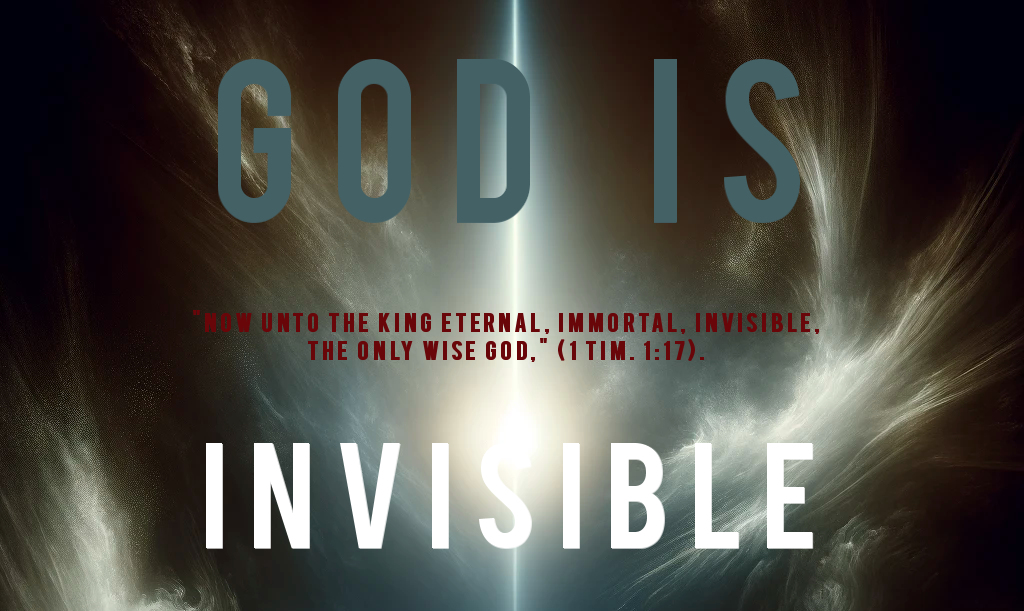“Now unto the King eternal, immortal, invisible, the only wise God,
be honor and glory for ever and ever. Amen.”
(1 Timothy 1:17)
In this glorious verse found in the first chapter of 1 Timothy, Paul highlights three of God’s attributes: that he is “eternal” – forever in perpetuity, without any limitations of created time; “immortal” – uncorrupted, not liable to any decay, the One who has life in himself; and “invisible” – one whose essence is infinite spirit which cannot be seen with the natural eye.
What’s interesting is that the word invisible in Scripture is exclusive to Paul’s writings as found in Romans 1:20, “For the invisible things of him from the creation of the world are clearly seen, being understood by the things that are made, even his eternal power and Godhead; so that they are without excuse,” Colossians 1:15, “Who is the image of the invisible God, the firstborn of every creature,” this verse in 1 Timothy 1:17, “Now unto the King eternal, immortal, invisible, the only wise God, be honor and glory for ever and ever. Amen,” and Hebrews 11:27, “By faith he forsook Egypt, not fearing the wrath of the king: for he endured, as seeing him who is invisible.”
Why does Paul continue to remind us that God is invisible? It seems the Apostle desires to clarify this truth with God’s people – that while the revelation of God’s mercy (for example) is seen in Christ, this same mercy has its source in, and flows from, the invisible God. Though by nature he is invisible, God himself is the source of all grace, all mercy, all goodness, all truth, all power… in short, all.
God is infinite, invisible, pure spirit, so he cannot be circumscribed by lines and features or be resembled or represented visibly other than through Christ. And though the heavens above and the earth beneath and all that is contained in creation declare the glory of the Creator (Ps. 19:1), the Son of God is the actual visible, physical, tangible manifestation of his invisible Father. For as John explains, “the Word [God] was made flesh and dwelt among us,” (John 1:14). And Christ himself explained that “whoever has seen me has seen the Father,” (John 14:9). In truth, our eternal and immortal salvation which the invisible God bestows by way of covenant is made manifest only through Christ, our Mediator.
Of course, in the Old Testament God revealed his presence to Israel using various means in nature such as with fire by night and a cloud by day to lead them through the wilderness. He got Moses’ attention using a burning bush that was not consumed, and his presence in the holy of holies was evidenced by a cloud of glory in the tabernacle and later in the temple. But these are merely physical demonstrations of God interacting with his people; they are not aspects of his essence or nature. Even the human nature of Jesus Christ, from a certain point of view, is an effect of the invisible God working through human flesh. Further, God would not have appeared in any form or shape by which the Israelites might attempt to delineate him and so be enticed to idolatry. “Ye heard the voice of words but saw no similitude; only ye heard a voice.” Deut. 4:12.”[1]
Finally, even God’s many names affirm his invisible nature – God our Righteousness, God our Healer, the Almighty God, the I AM. These characteristics of God’s nature do not connect him to any visible form. Instead, his names serve to elucidate his invisible nature so that we may perceive his divine essence by way of our understanding, and that by spiritual enlightenment through the work of the invisible Spirit of God in our soul.
Contemplations:
- Lord, you are of a singularly pure and spiritual nature. To be a spirit implies invisibility, efficacy, activity, unity.
- You are invisible in yourself but may be known by things visible. “He that sees the Son has seen the Father,” (John 14:9). We should praise God for all his excellencies, including his invisibility.
- I need to be aware of any sins of my heart and spirit like ignorance, pride, unbelief, insincerity (2 Cor. 7:1; 1 Thess. 5:23), as I know these are greatly despised by God. He is Spirit, so he especially hates those sins that arise out of a wicked heart and evil spirit. And what more evidence would demonstrate that than the Noahic flood? God completely wiped out every person on earth at that time except for Noah and his family because “every intent of the thoughts of their hearts was only evil continually,” (Gen. 6:5).
- When I affirm that You, Lord, are good and gracious, I understand that these are aspects of your essence. In contrast, when goodness and grace are observed in men, these are merely qualities and not who we are.
Further References for 1 Tim. 1:17:
Exod. 33:20; Deut. 4:15; John 4:24; 1 Kings 8:27; John 14:9; Colossians 2:9; Revelation 21:23; Gen. 28:10-22; Exodus 3:2, Exodus 14:19; Psalm 34:7; Judges 13:22.
[1] Ezekiel Hopkins, An Exposition of the Ten Commandments, (New York: The American Tract Society, n.d.), 143–144.


